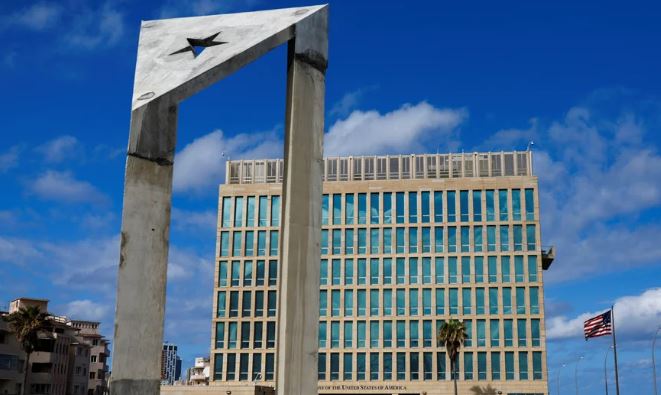The measure coincides with the largest Cuban migratory exodus in decades. Visa care and other procedures were closed in 2017 after embassy staff suffered a series of health problems, alleged sonic attacks that remain largely unexplained.
The US embassy in Cuba will resume its visa and consular services on Wednesday for the first time since a series of unexplained health incidents among diplomatic staff slashed the US presence in Havana in 2017.
The embassy confirmed this week that it will begin processing immigration permits, giving priority to reunification permits for Cubans with their families in the United States and others such as the diversity visa lottery.
The resumption coincides with the largest migratory exodus from Cuba in decades, which has raised pressure on the government of President Joe Biden to open more legal channels for the islanders and dialogue with the Cuban dictatorship despite the fact that historically the relationship between Washington and La Havana has been tense.
It is expected that at least 20,000 visas are granted a year, although that is just a drop in a wave of migration driven by the worsening of the economic and political crisis on the island.
At the end of December, the US authorities reported the detention of 34,675 Cubans on the border with Mexico during the month of November, 21% compared to the 28,848 cases in October. That number has been increasing month by month. Cubans are now the second largest nationality, after Mexicans, at the border, according to data from the US Customs and Border Protection.
The increase in migration is due to a complex series of factors such as the economic, energy and political crises, as well as deep discontent among Cubans.
Although most US-bound migrants leave the country on flights to Nicaragua and then cross the border with Mexico on foot, thousands have opted for the perilous sea journey. They travel 90 miles to reach the Florida coast, often in overcrowded and precarious boats.
Added to the Cuban exodus is the increase in emigration to the United States from countries like Haiti and Venezuela, forcing the government to deal with an increasingly complex situation on its southern border.
The resumption of processing of work visas at the embassy follows a series of contacts on migration and visits by US officials to Havana in recent months, and could be a sign of a slow thaw in tensions.
“Participation in these talks underscores our commitment to constructive dialogue with the Cuban government when appropriate to the interests of the United States,” the embassy said in a statement in November following a delegation visit.
These small steps are a far cry from the situation during the presidency of Barack Obama, who eased many of the sanctions dating back to the Cold War and paid a historic visit to the island in 2016.
Consular and visa services on the island were shut down in 2017 after embassy staff suffered a series of health problems, alleged sonic attacks that remain largely unexplained.
As a result, many Cubans who wanted to migrate legally to the United States have had to fly to places like Guyana before doing so or to join their families.
Although the relationship between the two nations has always been tense, the situation became complicated after the closure of the diplomatic legation and the tightening of sanctions by the government of former President Donald Trump.
Since the arrival of Joe Biden to the White House, some restrictions on issues such as remittances or family trips from Miami to Cuba have been eased, but it has not fulfilled the hopes of many of returning the island to the “Obama era.”
Restrictions on tourist visas to Cuba and on the import and export of many products remain in force.
Another factor in the tensions was the harshness with which the insular Cuban dictatorship treated participants in the 2021 protests, including imposing heavy prison terms on minors, a constant source of criticism from the Biden administration.
Cuban authorities have repeatedly expressed optimism about talks with the United States and the resumption of visa services. The country’s deputy foreign affairs minister, Carlos Cossio, said in November that guaranteeing migration through legal and safe channels was a “mutual objective.”
But Cossio also blamed the departure of tens of thousands of people from the island to US sanctions and stated that this policy “depresses the standard of living” of the population and is a direct factor in migration.

